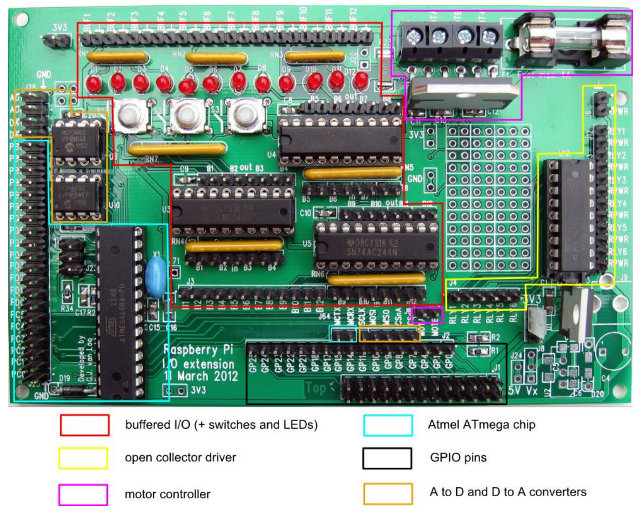More expansion boards for the Raspeberry Pi are coming out. This time, the Raspberry Pi Foundation announced the “semi-official” Gertboard expansion board that has been designed by Gert van Loo, a member of the foundation, but is not an official Raspberry Pi Foundation product. This board expands the Raspberry Pi’s “GPIO” pins and allows you to interface with the outside world in several ways including:
- Drive motors to open doors, lift things, or power robotics
- Communicate with sensors such as temperature, gas, light.. sensors
- Switch devices on and off
- Control LEDs

The boards is composed of the following key building blocks:
- 12x buffered I/O
- 3x push buttons
- 6x open collector drivers (50V, 0.5A)
- 48V, 4A motor controller
- 28-pin dual in line ATmega microcontroller
- 2-channel 8/10/12 bit Digital to Analogue converter
- 2-channel 10 bit Analogue to Digital converter
The gertboard is sold unassembled with the bare PCB and all the components you need, so it would also make a good soldering training platform. Luckily, it comes with a very detailed assembly manual that will guide you thru all the soldering steps.If you are not familiar at all with soldering, Gert van Loo has shot a few videos showing how to solder components to the gertboard. Here’s the one with through-hole components such as LED, capacitor…
A user manual is also included. It explains details about the board, and provides some getting started examples such as lighting up an LED or controlling a motor.
The board is available for pre-order now for $60 and should ship within 1 month. It is only available on Newark/Elements14. Here’s the link for Newark America, but the link won’t work for other countries since Elements14 is one of the crappiest website I’ve ever seen when it comes to linking. If you want to find it in your local website search for “GERTBOM”.

Jean-Luc started CNX Software in 2010 as a part-time endeavor, before quitting his job as a software engineering manager, and starting to write daily news, and reviews full time later in 2011.
Support CNX Software! Donate via cryptocurrencies, become a Patron on Patreon, or purchase goods on Amazon or Aliexpress




